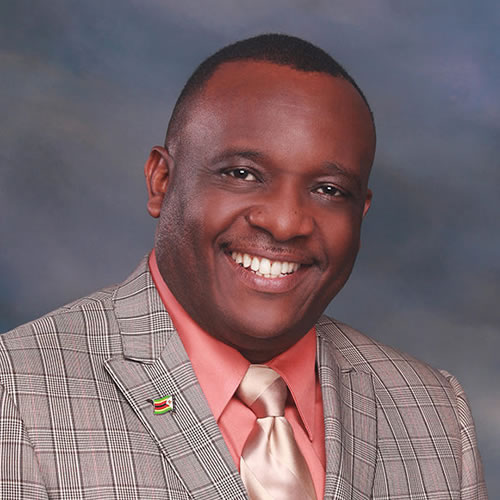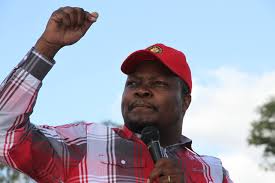Dr. Manyika unpacks Zimbabwe’s political equation

President of Build Zimbabwe Dr. Noah Manyika
By Dr. Noah Manyika
Job Sikhala is calling for the kind of critical discussion the cause for change in Zimbabwe desperately deserves. I would add that there are many people who have sought to “unpack the equation” as Sikhala puts it, but the stubborn facts they share are often viewed as inconvenient, and those who share them as “Killjoys and Grinches” by some who tend to reduce the purpose of the cause to fulfilling the political destinies of individuals and organizations. We must have the courage and decency to call that tendency what it is: a dangerous distortion, even betrayal of the cause which is supposed to be about the people.

History has taught us repeatedly that in Africa, popularity alone cannot win elections against incumbents whose strategic intelligence opposition movements tragically underestimate, and who are as resourced and as determined to retain power as they are old, corrupt and incompetent.
In 2009, I hosted the late Morgan Tsvangirai and his team in the US for a day. One question I respectfully asked him was:
“What is the basis for 110 rural constituencies and only 60 urban? Has a sound census been conducted which justifies this kind of delimitation?”
I knew from information gathered while advising the Organ for National Healing at that time that Zanu(PF) was very happy with this delimitation because it had done the math: It understood that even if the opposition won all the 60 urban seats, the 110 rural constituencies would be in Zanu(PF)’s bag with the help of over 270 Chiefs, thousands of village heads and rural government structures controlled by partisan district and provincial workers. My suggestion to Dr. Tsvangirai who I had (and still have) the utmost respect and admiration for was that this needed to be urgently addressed before the end of the GNU to avoid giving Zanu(PF) an electoral advantage that would be impossible for any opposition movement to overcome in the near term, no matter how much “popular” support it had.
Those who have followed elections in other places know that winning the popular vote only translates to an electoral victory depending on how constituencies are delimited. It is extremely naive to think that gerrymandering in Zimbabwe only affects parliamentary election results since we don’t use the electoral college system for presidential elections. The fact is that rural constituencies make it possible for Zanu(PF) to manipulate the presidential vote in ways that are almost impossible to prove in any court of law, let alone those run by partisan judges, making the challenging of electoral outcomes seem like sour grapes. While there doesn’t seem to be anything the opposition can do to address the issue of constituency delimitation before the 2023 election (that opportunity was lost once the GNU ended), it is critical for this stubborn fact and others to inform any strategies, messaging and choice of leaders going forward.
So…
- Because of the electoral lay of the land, and again… not just to fulfill any individual’s or organization’s political destiny, but for the sake of the cause and the destiny of the young people themselves, young Zimbabweans must register to vote in unprecedented numbers.
- The strategies, messaging and quality of those put forward for office must enable the opposition to retain those who voted for it before by proving that they have learned the lessons of the past and are keenly aware that incumbents won’t concede power simply because we are right, young, or we demand it, or are “more popular” than they are.
- The opposition’s messaging and leadership must attract those who have never voted for it before who are put off by how the cause is represented. That would require a willingness to change both the substance and style of our politics, our leadership, our messaging for the sake of the cause.
- Bringing the struggle to that critical tipping point that brings change requires the kind of messaging that convinces everybody that change is in their best interests. Everybody includes every generation, every class, educated and uneducated, civilians and military, rural and urban dwellers, including those who have supported the ruling party before.
- The leadership style, language, messaging that impresses the local gallery does not necessarily impress or engage serious external constituencies that need to be leveraged. Those who could be effective allies often cringe at what local supporters cheer. While that may be the result of potential partners failing to understand the local context, it is also too often the result of self-referencing politics that doesn’t understand the global context in which we live.
The excitement Zimbabweans feel about what is going on to our immediate North is completely understandable. I lost my friendship with a Zambian friend 37 years ago when Frederick Chiluba was a fiery trade union leader challenging UNIP’s one-party state and Kenneth Kaunda’s rule. My crime was suggesting that every Zambian needed to own that struggle, and that the purpose of the cause should never be reduced to fulfilling Chiluba’s political destiny. I love Zimbabwe too much not to commit the same “crime” and will gladly lose anyone that I have called a friend by adding this dimension to the conversation Job Sikhala is urging us to have:
· It has taken Zambians 30 years since Chiluba took office in 1991 to get to the Hichilema era. We must think not only about how to translate popularity to power, but what happens when that popularity is translated to power. Zanu(PF) translated popularity to power in 1980, and this is where we are.
· The idea that generals and police officers etc., were still behaving like Zambia was a one-party state during this last election is an indictment of Zambia’s leadership in the post-Kaunda era, and gives credence to authors Kimenyi and Moyo’s assessment that while Chiluba and his party successfully translated popularity to power, his legacy is one of a failed democratic transition (https://www.brookings.edu/opinions/the-late-zambian-president-fredrick-chiluba-a-legacy-of-failed-democratic-transition/)
· We Africans don’t do ourselves any favors with this idiotic: Lets get power first and we will deal with everything else later. Where has that ever worked?
Change will come to Zimbabwe, but it better not be just a change of government or ruling class or ruling individuals. It must be the change that enables every Zimbabwean, every generation, every tribe, every race, every class, the educated and uneducated, civilians and military, rural and urban dwellers to fulfill their destiny.
Is There Not a Cause?
—Dr. Noah Manyika is President of Build Zimbabwe Alliance






